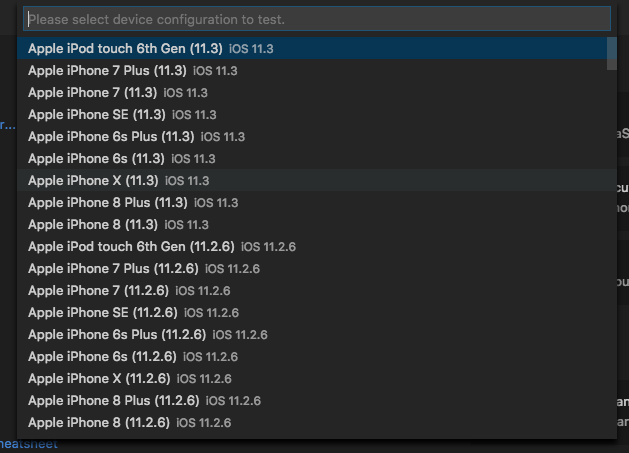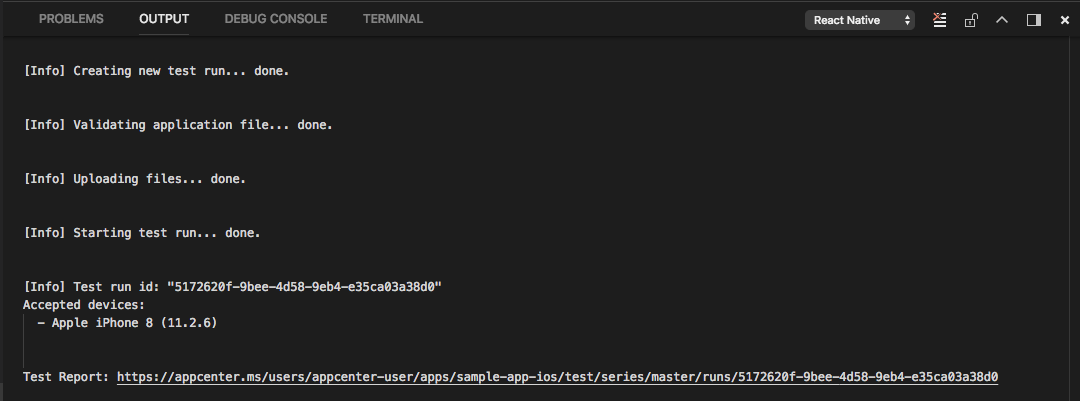* Test fixes |
||
|---|---|---|
| .vscode | ||
| bin/windows | ||
| images | ||
| src | ||
| test | ||
| .gitignore | ||
| .travis.yml | ||
| .vscodeignore | ||
| CHANGELOG.md | ||
| LICENSE | ||
| README.md | ||
| gulpfile.js | ||
| package-lock.json | ||
| package.json | ||
| tsconfig.json | ||
| tslint.json | ||
README.md
VSCode App Center Tools
This extension provides development support for App Center projects.
NOTE: Currently it supports only React-Native based apps.
Getting Started
- Install VS Code
- Install the extension
- If you haven't already, please also install:
How it works
There are several possible scenarios this extension solves:
-
Start development of a new React Native application with App Center already configured:
-
Open an empty folder where you would like to create a new application.
-
Login to App Center using the status bar icon.
-
Login to Visual Studio Team Services using the status bar icon.
If you don't already have a personal access token to access your VSTS account you can go here to learn how to create one.
-
After logging in, click the App Center status bar to show possible menu options and shoose
Start a new project. -
You will be prompted to enter a new name for your project and select user or organization where you would like to create app in App Center.
- App Center sample app will be cloned into the repository you have provided (it will also have preconfigured for App Center Analytics/Crashes/CodePush SDK's)
- Two React Native apps (for iOS and Android) will be created in App Center (
project-name-iosandproject-name-android) - CodePush deployments will be created for both apps
- Apps will be automatically linked with corresponding iOS/Android secret keys and CodePush deployment keys
- Changes will be pushed to your remote repository
- New Testers Distribution Group will be created for every new app in App Center
Tip: If you enable
appcenter.api.configurebranchandstartnewbuildin extension sessings, the app will also be connected to your GH repositorymasterbranch and new build will be started- You will be notified when everything's finished and also we will automatically run
npm installandpod updatefor you
-
-
Link an existing React Native application to App Center. You will see a
Set Current Appoption, when logged in.You can either choose an app from App Center or choose it to be created for you. When you pick
Create an App Center appoption, several options are available:- Create an app for Android
- Create an app for iOS
- Create apps for both platforms
If you choose one of the first two, the app will be created and automatically set as current. If you choose to create two apps, you will have to pick one of them as current when a prompt is shown.
When the current app is set, several new options appear in the menu:
- Test (only for iOS)
- CodePush
They all open the corresponding App Center tabs for the application.
CodePushalso contains CodePush stuff.Tip: If you enable
appcenter.crashessetting, you will seeSimulate crashesmenu option underCrashes. It sends test crash data to the linked App Center application. -
Link CodePush module to an existing React Native application. When inside of a React Native application, you will see a
Link CodePushbutton underCodePushmenu. Choose it.- You will be prompted to choose an Android and iOS app to link.
- CodePush SDK for React Native will be installed and saved into your
plugin.json. - Deployment keys for the chosen applications will be fetched or created
- We will run
react-native link react-native-code-pushfor you and automatically fill all the prompts, and notify you when finished.
-
Link App Center to an existing React Native application. When inside of a React Native application, you will see an
Install SDKbutton in menu. Choose it.- You will be prompted to choose an Android and iOS app to link.
- App Center SDK for React Native will be installed and saved into your
plugin.json. - App secrets for the chosen applications will be fetched
- We will run
react-native link appcenterfor you and show you the secrets to be pasted.
Pay attention: Unlike linking CodePush, you will have to paste these secrets in the Terminal yourself when prompted.
-
You would like to open already existing React Native application with CodePush installed. When logged in, the following App Center Menu options should be avaliable under
CodePush:- Link CodePush
- Navigate to CodePush tab in App Center
- Make a new CodePush release
- Change current Deployment
- Change target binary verson
- Change if release should be mandatory
Test
If your React Native application has UI tests, you can run it in the App Center cloud using the extension.
Preparing tests
In order to run the tests in App Center cloud, you need App Center CLI. To install it, run npm install -g appcenter-cli in terminal.
iOS
Extension supports XCUI tests only. Please, follow the instructions for App Center portal docs to prepare tests for uploading to the App Center cloud.
Android
Extension supports Espresso tests only. Please, follow the instructions for App Center portal docs to prepare tests for uploading to the App Center cloud. You only have to complete steps 1 - 3, we will run all the builds and upload tests to the portal for you.
Running tests
-
Open App Center menu and then click
Testbutton. -
To run tests, you can use two options:
Run UI testsandRun UI tests asynchronously. CommandRun UI testswill start to build your application for testing, upload it together with tests to App Center cloud and then run it there waiting for tests to be done. CommandRun UI tests asynchronouslydoes the same thing except it exits the command when tests are uploaded, without waiting for test results. Choose the one you prefer the most. Also, you can track progress of command below in status bar.
- Select device configuration for tests. If you have device sets, they will appear at the top of the list and you can choose them.
- After that,
Output > React Nativewindow will be opened, where you can monitor the progress of the build, upload and run the tests.
Contributing
There are a couple of ways you can contribute to this repo:
- Ideas, feature requests and bugs: We are open to all ideas and we want to get rid of bugs! Use the Issues section to either report a new issue, provide your ideas or contribute to existing threads.
- Documentation: Found a typo or strangely worded sentences? Submit a PR!
- Code: Contribute bug fixes, features or design changes.
Troubleshooting
Here is the list of common known issues you may experience while using the extension:
| Issue | Description |
|---|---|
You received error 'failed to push to remote ... Device not configured' when starting new project and pushing to remote repo |
Install Git Credential Manager and try again |
You received error 'CocoaPods was not able to update the master repo' when running 'pod repo update' while linking App Center |
Delete and recreate your specs for repo by running pod repo remove master and pod setup commands |
Legal
Before we can accept your pull request you will need to sign a Contribution License Agreement. All you need to do is to submit a pull request, then the PR will get appropriately labelled (e.g. cla-required, cla-norequired, cla-signed, cla-already-signed). If you already signed the agreement we will continue with reviewing the PR, otherwise system will tell you how you can sign the CLA. Once you sign the CLA all future PR's will be labeled as cla-signed.
Code of conduct
This project has adopted the Microsoft Open Source Code of Conduct. For more information see the Code of Conduct FAQ or contact opencode@microsoft.com with any additional questions or comments.











